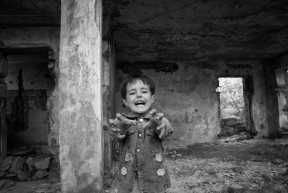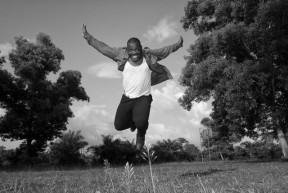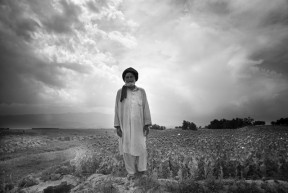Photographs from a war zone – resolute soldiers firing guns and bombarding whatever remotely resembles the enemy, aftermath of devastated landscapes, victory dance of the one who has had the last laugh and shattered faces of the vanquished – make for great selling visuals. War enjoys exciting press in our storytelling tradition. But the thrills and chills of living in a war zone has motivated Bangalore based photographer and documentary maker Ryan Lobo to capture that rare element of human emotion that perhaps no soldier or editorial boardroom ever considers – forgiveness.
Does forgiveness have place in a war zone? Why is it that our ideas of victory often involve defeating an enemy outside ourselves? Can redemption replace our idea of justice? These are the questions Lobo has asked himself, as he travelled to the three most dangerous war zones of Liberia, Afghanistan and Iraq in 2007, to come up with an exhibition titled War And Forgiveness. The exhibition is Lobo’s intensely personal documentation of the fact that more than war and its after effects, it’s the power to forgive and absolve people of their crimes that can leave a bigger impact.
“I have come away from war with a sense of guilt which for a long while I could not explain. I wondered what use it would be to exhibit photographs of faraway wars in India until I decided that an interesting thing about working in war zones was not the fear of death. It is seeing the same thing, perhaps the seeds of the same thing within ourselves, myself, in our conversations and in the way we treat our own people. We come home to see a similar situation — of corruption, mismanagement of funds, we see injustice. There are different forms of war everywhere… War zones of a different sort where we are often the banal and apathetic audience,” he says.
Why Lobo chose to photograph tales of forgiveness rather than retribution goes back to a fascinating interaction with an African general who was a brutal mass murderer before turning a Christian evangelist called Joshua. A meeting that would leave Lobo with a “deep and lasting impression” and also become the subject of an award winning film The Redemption of General Butt Naked that won best cinematography and was short-listed for best documentary at the Sundance film festival.
“Joshua definitely set me off down an internal philosophical journey. This Liberian warlord, who reportedly fought stark naked claims to have murdered approximately 20,000 people. We accompanied him as he walked the earth, visiting villages where he had once murdered, seeking forgiveness and endeavouring to improve the lives of his former child soldiers. I expected him to be killed outright but what I witnessed opened my eyes to an idea of forgiveness, which I always thought seemed impossible. In the midst of incredible poverty and loss, I watched people who had nothing, absolve a man who had taken everything from them.”
From his experiences in Liberia, another image that has stayed with Lobo is of a woman forgiving an army general who had killed her brother. “It seemed strange to me that people who have suffered terribly find it easier to forgive, find personal healing in that act, and are open to peaceful resolutions than those who have ostensibly not suffered. Or maybe they are just very tired and incapable of other actions. I do not know.”
Apart from a war criminal’s search for redemption in the aftermath of a civil war in Liberia, Lobo also takes us, through his show, on a visual journey of the heroin trade in Taliban-backed Afghanistan and the lives of people in war-torn Baghdad. His stark black and white photographs are complex tales of simple people whose lives have turned upside down during and after war. But Lobo does not romanticise war photography. He does not resort to guns and gore to attract eyeballs.
Interestingly, it was with the idea of making documentary films that had taken Lobo to these places. In Iraq, he was commissioned to shoot a film on the life of local people there during the conflict. While the film itself didn’t materialise, he came away with photographs and his journal, which now functions as a catalogue for the exhibition.
“In Afghanistan, I was commissioned to work on a film about the heroin trade for Nat Geo TV and travelled to Kabul and Jalalabad to interview farmers and the poppy eradication efforts being carried out in Afghanistan at that time,” he says.
The job wasn’t an easy one. “Our filmmaking in Iraq and Afghanistan would have been suicidal if it was not for the presence of our security contractors especially in Iraq. We could hear gunfire and bombs going off all the time and could not move out of the protected house we stayed, unless accompanied by a convoy of armed men.”
In Afghanistan, for instance, there was one time when Lobo had to flee a village where he was taking pictures of heroin being farmed. “We were told the Taliban were on their way there to kidnap us.”
Apart from these three “most vivid experiences” of his life, Lobo has worked on several subjects as a film maker and photographer – India’s eunuchs, child adoption in India, man-elephant conflict, body art in Papua New Guinea, signature dishes of the Anglo-Indian community, American prisons, exorcism, dinosaur fossils, Sri Lanka’s Tsunami volunteers and Thailand’s child boxers to name a few.
But it is photography that inspires Lobo most today. “While making films, I found photography more compulsive. Filmmaking is a team effort and one’s individual artistic vision is somewhat compromised.” In 2009, Lobo shared his photographs and his ideas on “compassionate storytelling” at the TED conference, to a standing ovation.
So, when we read those screaming headlines that Osama Bin Laden has been at last killed and cheer that justice has been finally done, let’s wish that compassion, as Lobo expects, will bring healing to all sides.
And that there is hope. For all of us.
Ryan Lobo’s photography show, War And Forgiveness, is being presented by Tasveer at Art Motif Gallery, Lado Sarai, New Delhi till May 6, 2011
.








